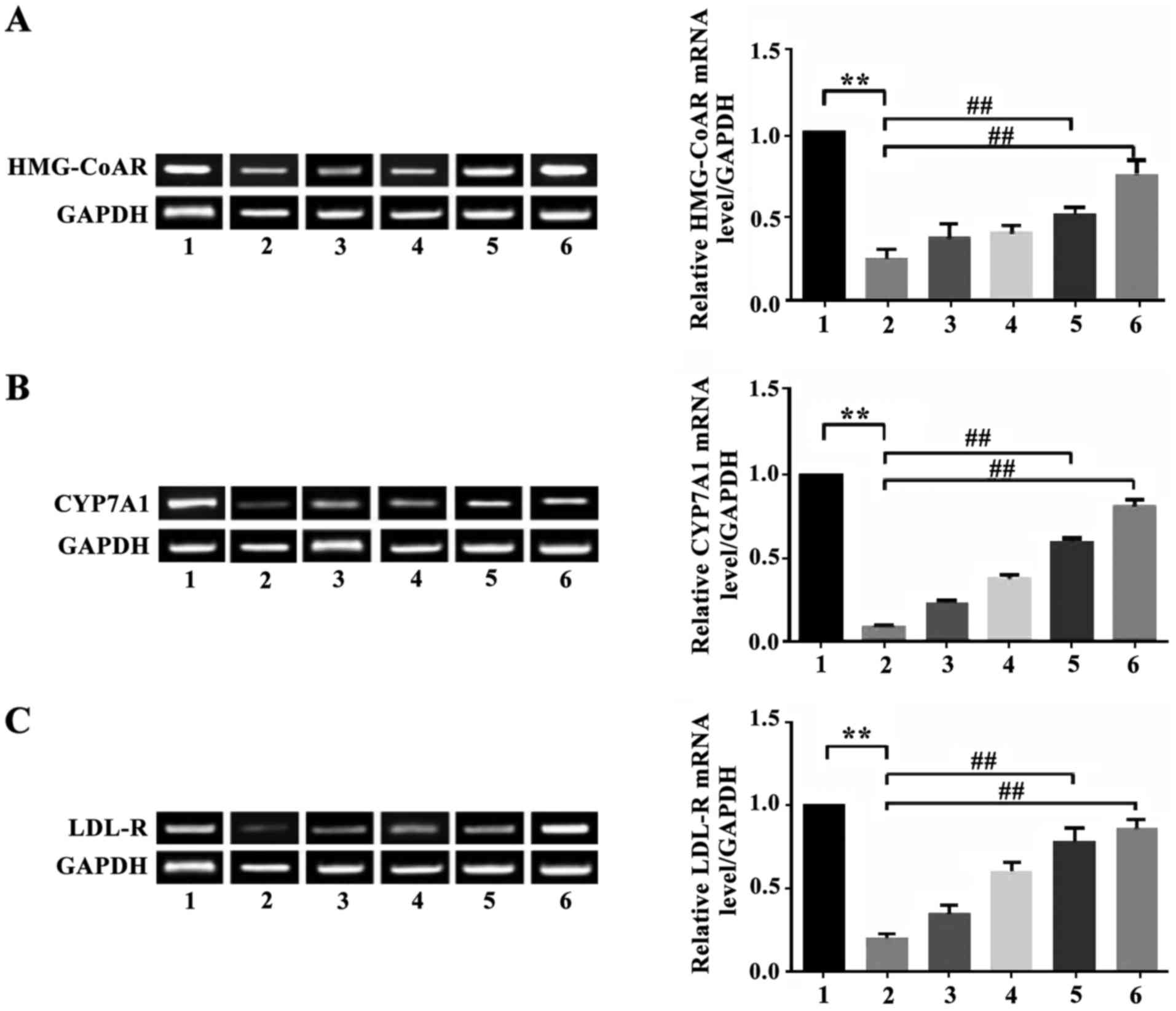|
1
|
Liu-Smith F and Meyskens FL: Molecular
mechanisms of flavonoids in melanin synthesis and the potential for
the prevention and treatment of melanoma. Mol Nutr Food Res.
60:1264–1274. 2016. View Article : Google Scholar : PubMed/NCBI
|
|
2
|
Yarla NS, Bishayee A, Sethi G, Reddanna P,
Kalle AM, Dhananjaya BL, Dowluru KS, Chintala R and Duddukuri GR:
Targeting arachidonic acid pathway by natural products for cancer
prevention and therapy. Semin Cancer Biol. Feb 4–2016.(Epub ahead
of print). doi: 10.1016/j.semcancer.2016.02.001. View Article : Google Scholar : PubMed/NCBI
|
|
3
|
Moosavi F, Hosseini R, Saso L and Firuzi
O: Modulation of neurotrophic signaling pathways by polyphenols.
Drug Des Devel Ther. 10:23–42. 2015.PubMed/NCBI
|
|
4
|
Venigalla M, Sonego S, Gyengesi E, Sharman
MJ and Münch G: Novel promising therapeutics against chronic
neuroinflammation and neurodegeneration in Alzheimer's disease.
Neurochem Int. 95:63–74. 2016. View Article : Google Scholar : PubMed/NCBI
|
|
5
|
Venigalla M, Gyengesi E and Münch G:
Curcumin and apigenin - novel and promising therapeutics against
chronic neuroinflammation in Alzheimer's disease. Neural Regen Res.
10:1181–1185. 2015. View Article : Google Scholar : PubMed/NCBI
|
|
6
|
Shakeri F and Boskabady MH: A review of
the relaxant effect of various medicinal plants on tracheal smooth
muscle, their possible mechanism(s) and potency. J Ethnopharmacol.
175:528–548. 2015. View Article : Google Scholar : PubMed/NCBI
|
|
7
|
Sak K: Cytotoxicity of dietary flavonoids
on different human cancer types. Pharmacogn Rev. 8:122–146. 2014.
View Article : Google Scholar : PubMed/NCBI
|
|
8
|
Maurya SK, Kushwaha AK and Seth A:
Ethnomedicinal review of Usnakantaka (Echinops echinatus
Roxb.). Pharmacogn Rev. 9:149–154. 2015. View Article : Google Scholar : PubMed/NCBI
|
|
9
|
Armstrong CM and Gao AC: Drug resistance
in castration resistant prostate cancer: resistance mechanisms and
emerging treatment strategies. Am J Clin Exp Urol. 3:64–76.
2015.PubMed/NCBI
|
|
10
|
Shay J, Elbaz HA, Lee I, Zielske SP, Malek
MH and Hüttemann M: Molecular mechanisms and therapeutic effects of
(−)-epicatechin and other polyphenols in cancer, inflammation,
diabetes, and neurodegeneration. Oxid Med Cell Longev.
2015:1812602015. View Article : Google Scholar : PubMed/NCBI
|
|
11
|
Johnston GA: Flavonoid nutraceuticals and
ionotropic receptors for the inhibitory neurotransmitter GABA.
Neurochem Int. 89:120–125. 2015. View Article : Google Scholar : PubMed/NCBI
|
|
12
|
Guedj F, Bianchi DW and Delabar JM:
Prenatal treatment of Down syndrome: a reality? Curr Opin Obstet
Gynecol. 26:92–103. 2014. View Article : Google Scholar : PubMed/NCBI
|
|
13
|
Fernando W, Rupasinghe HP and Hoskin DW:
Regulation of hypoxia-inducible factor-1α and vascular endothelial
growth factor signaling by plant flavonoids. Mini Rev Med Chem.
15:479–489. 2015. View Article : Google Scholar : PubMed/NCBI
|
|
14
|
Li A, Sun A, Liu R, Zhang Y and Cui J: An
efficient preparative procedure for main flavonoids from the peel
of Trichosanthes kirilowii Maxim. using polyamide resin
followed by semi-preparative high performance liquid
chromatography. J Chromatogr B Analyt Technol Biomed Life Sci.
965:150–157. 2014. View Article : Google Scholar : PubMed/NCBI
|
|
15
|
Nabavi SM, Habtemariam S, Daglia M and
Nabavi SF: Apigenin and Breast Cancers: from Chemistry to Medicine.
Anticancer Agents Med Chem. 15:728–735. 2015. View Article : Google Scholar : PubMed/NCBI
|
|
16
|
Gupta SC, Tyagi AK, Deshmukh-Taskar P,
Hinojosa M, Prasad S and Aggarwal BB: Downregulation of tumor
necrosis factor and other proinflammatory biomarkers by
polyphenols. Arch Biochem Biophys. 559:91–99. 2014. View Article : Google Scholar : PubMed/NCBI
|
|
17
|
Cochran DB, Gray LN, Anderson KW and
Dziubla TD: Degradable poly(apigenin) polymer inhibits tumor cell
adhesion to vascular endothelial cells. J Biomed Mater Res B Appl
Biomater. Aug 6–2015.(Epub ahead of print). doi:
10.1002/jbm.b.33486. PubMed/NCBI
|
|
18
|
Mastantuono T, Battiloro L, Sabatino L,
Chiurazzi M, Di Maro M, Muscariello E, Colantuoni A and Lapi D:
Effects of citrus flavonoids against microvascular damage induced
by hypoperfusion and reperfusion in rat pial circulation.
Microcirculation. 22:378–390. 2015. View Article : Google Scholar : PubMed/NCBI
|
|
19
|
Alig SK, Stampnik Y, Pircher J, Rotter R,
Gaitzsch E, Ribeiro A, Wörnle M, Krötz F and Mannell H: The
tyrosine phosphatase SHP-1 regulates hypoxia inducible factor-1α
(HIF-1α) protein levels in endothelial cells under hypoxia. PLoS
One. 10:e01211132015. View Article : Google Scholar : PubMed/NCBI
|
|
20
|
Zargaran A, Borhani-Haghighi A, Faridi P,
Daneshamouz S, Kordafshari G and Mohagheghzadeh A: Potential effect
and mechanism of action of topical chamomile (Matricaria
chammomila L.) oil on migraine headache: a medical hypothesis.
Med Hypotheses. 83:566–569. 2014. View Article : Google Scholar : PubMed/NCBI
|
|
21
|
Chen X, Jin J, Chen Y, Peng L, Zhong G, Li
J, Bi H, Cai Y and Huang M: Effect of scutellarin on the metabolism
and pharmacokinetics of clopidogrel in rats. Biopharm Drug Dispos.
36:64–68. 2015. View
Article : Google Scholar : PubMed/NCBI
|
|
22
|
Seo HS, Ku JM, Choi HS, Woo JK, Jang BH,
Go H, Shin YC and Ko SG: Apigenin induces caspase-dependent
apoptosis by inhibiting signal transducer and activator of
transcription 3 signaling in HER2-overexpressing SKBR3 breast
cancer cells. Mol Med Rep. 12:2977–2984. 2015.PubMed/NCBI
|
|
23
|
Chen YJ, Wang L, Zhou GY, Yu XL, Zhang YH,
Hu N, Li QQ, Chen C, Qing C, Liu YT, et al: Scutellarin attenuates
endothelium-dependent vasodilation impairment induced by hypoxia
reoxygenation, through regulating the PKG signaling pathway in rat
coronary artery. Chin J Nat Med. 13:264–273. 2015.PubMed/NCBI
|
|
24
|
Lee W, Yoon EK, Kim KM, Park DH and Bae
JS: Antiseptic effect of vicenin-2 and scolymoside from Cyclopia
subternata (honeybush) in response to HMGB1 as a late sepsis
mediator in vitro and in vivo. Can J Physiol Pharmacol. 93:709–720.
2015. View Article : Google Scholar : PubMed/NCBI
|















